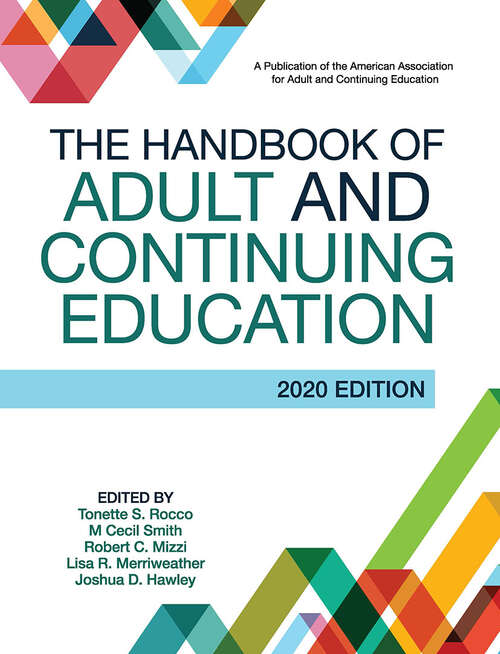
The Handbook of Adult and Continuing Education
Essais et documents généraux
Audio avec voix de synthèse, Braille automatisé
Résumé
Co-published with Colleges and universities are increasingly becoming significant sites for adult education scholarship—in large part due to demographic shifts. With fewer U.S. high school graduates on the horizon, higher education institutions will need to attract “non-traditional” (i.e., older) adult… learners to remain viable, both financially and politically. There is a need to develop a better corpus of scholarship on topics as diverse as, what learning theories are useful for understanding adult learning? How are higher education institutions changing in response to the surge of adult students? What academic programs are providing better learning and employment outcomes for adults in college? Adult education scholars can offer much to the policy debates taking place in higher education. A main premise of this handbook is that adult and continuing education should not simply respond to rapidly changing social, economic, technological, and political environments across the globe, but should lead the way in preparing adults to become informed, globally-connected, critical citizens who are knowledgeable, skilled, and open and adaptive to change and uncertainty.The Handbook of Adult and Continuing Education provides rich information on the contemporary issues and trends that are of concern to adult and continuing education, of the programs and resources available to adult learners, and of opportunities to challenge and critique the structures embedded in the field that perpetuate inequity and social injustice. Adult education is a discipline that foresees a better tomorrow, and The Handbook is designed to engage and inspire readers to assist the field to seek new paths in uncertain and complex times, ask questions, and to help the field flourish.The Handbook is divided into five sections. The first, Foundations situates the field by describing the developments, core debates, perspectives, and key principles that form the basis of the field.The second, Understanding Adult Learning, includes chapters on adult learning, adult development, motivation, access, participation, and support of adult learners, and mentoring.Teaching Practices and Administrative Leadership, the third section, offers chapters on organization and administration, program planning, assessment and evaluation, teaching perspectives, andragogy and pedagogy, public pedagogy, and digital technologies for teaching and learning.The fourth section is Formal and Informal Learning Contexts. Chapters cover adult basic, GED, and literacy education, English-as-a-Second Language Programs, family literacy, prison education, workforce development, military education, international development education, health professions education, continuing professional education, higher education, human resource development and workplace learning, union and labor education, religious and spiritual education, cultural institutions, environmental education, social and political movements, and peace and conflict education.The concluding Contemporary Issues section discusses decolonizing adult and continuing education, adult education and welfare, teaching social activism, lesbian, gay, bisexual, trans, queer and straight allies, gender and its multiple forms, disability, older adults and intergenerational identities, race and ethnicity, working class, whiteness and privilege, and migrants and migrant education.The editors culminate with consideration of next steps for adult and continuing education and priorities for the future.